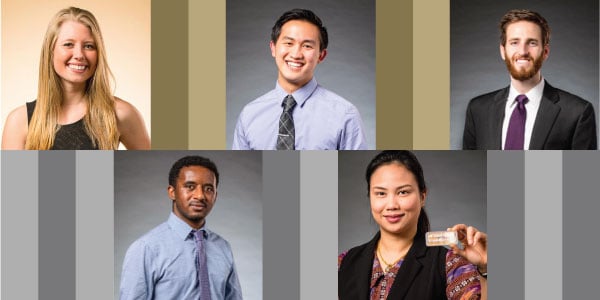Five UW Bioengineering students have been named to the third annual class of the Husky 100. Undergraduates Robyn Langevin, Solomon Muche and Caleb Perez, and graduate students Nuttada Panpradist and Ty Youngblood are among 100 students selected from Bothell, Seattle and Tacoma campuses in all areas of study making the most of their time at UW.
The Husky 100 connect to life inside and outside the classroom, and apply what they learn to make a difference on campus, in their communities and for the future. They demonstrate passion, leadership and commitment to inspire all at UW to shape their own Husky Experience. Students are selected based upon their demonstration of a mindset of discovery, commitment to fostering an inclusive community, capacity for leadership, readiness for life’s next steps and willingness to experience learning beyond the classroom.
This year’s Husky 100 were recognized at an on-campus celebration event May 7, and will benefit from future opportunities to network with UW students, alumni, faculty, staff and business leaders. They are also featured in individual profiles on the UW’s Husky 100 website.
Robyn Langevin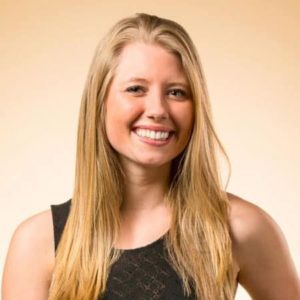
Senior Robyn Langevin is a member of Electrical Engineering/Computer Science Associate Professor Georg Seelig’s synthetic biology lab. At UW, Robyn has explored experiences across research, health care and industry. By bridging all three, she hopes to be able to translate research innovation to patient care.
She is working with BioE Ph.D. student Randolph Lopez to develop a cost-effective and minimally invasive assay for early cancer diagnosis. They aim to emulate the highly effective diagnostic capabilities of expensive lab-based RNA sequencing in a clinical protocol. The assay, which detects the expression of genes associated with specific types of cancer, could enable more accurate and routine screening of patients, and lead to improved treatment outcomes.
Robyn’s research team is working on a prototype of the assay that can differentiate between kidney, breast and pancreatic cancer cell lines by targeting only five genes. Their approach could also be used to diagnose other conditions that show differential gene expression, such as autoimmune disorders or heart disease. They plan to move forward to develop a clinical sample protocol for a specific disease and optimize their device for clinical applications.
Beyond the lab, Robyn is actively engaged in educational outreach and sees this work as one of the most profound parts of her undergraduate experience. She has served as head of community outreach for UW’s chapter of the Biomedical Engineering Society, and the outreach chair of the engineering sorority Phi Sigma Rho. In these roles, she has helped develop new teaching modules, showcase UW BioE to the local community and work directly with hundreds of kids.
Robyn has become interested in the business side of biotech and will join consulting firm Accenture after graduating. She’s enjoyed having the opportunity to work on viable solutions for health care at UW and looks forward to applying her engineering skills to continue solving global challenges.
Solomon Muche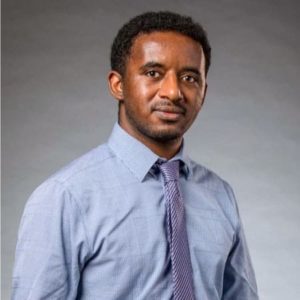
Solomon Muche is a senior in Professor Wendy Thomas’s lab investigating the initial stages of infective endocarditis (IE), or infection of the heart valves. IE is most commonly caused by streptococci or staphylococci bacteria. The condition is difficult to treat due to the increasing prevalence of drug-resistant bacteria and the ability of the bacteria that cause IE to withstand the heart’s high shear stress environment.
In the Thomas lab, Solomon is helping develop an in vitro model to characterize the conditions that cause IE to develop. Researchers can use the tool to analyze the spatial and temporal characteristics that facilitate bacteria binding to heart tissue. This innovative tool could inform the development of novel treatments for IE and other endovascular infections that persist in high shear stress environments
Solomon and his family immigrated to Washington in 2012 from Ethiopia. Despite enormous adversity – he barely spoke English and his family lived in a homeless shelter – he persevered. He took challenging Advanced Placement coursework and ultimately excelled at school.
After enrolling at UW as a BioE direct freshman admit and starting research in the Thomas lab, Solomon embraced opportunities to promote cross-cultural exchange and collaboration in the department. He teamed up with other BioE students to form BioEnspire, an effort to foster diversity and inclusion in the BioE community, and to promote professional development. Outside of bioengineering, he helped refugee children at the shelter where he and his family lived for eight months in downtown Seattle, and served a leadership role on UW’s Residential Community Student Association (RCSA) Hall Council.
This fall, Solomon will pursue a master’s degree at Yale University’s School of Engineering and Applied Science in biomedical engineering. As a 2018 National Science Foundation Graduate Research Fellow, he plans to advance his research and training in tissue engineering at Yale. After finishing his master’s, Solomon plans to apply to M.D./Ph.D. programs to bring his talents to the fields of medicine and global health.
Caleb Perez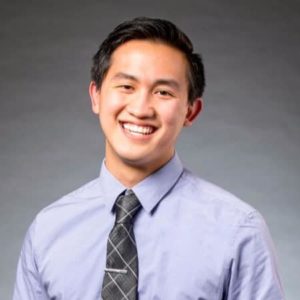
Caleb Perez, a senior in Robert F. Rushmer Professor Suzie Pun’s lab, investigates strategies for cancer immunotherapy. In the Pun lab, he focuses on improving CAR T cells, or immune cells that are genetically engineered to express a receptor that specifically targets cancer cells. He is one of 10 2018 recipients of a Fulbright/Swiss Government Open Study/Research Award, and will work for a year at École Polytechnique Fédérale de Lausanne (EPFL) with Dr. Michele De Palma’s lab in the Swiss Institute for Experimental Cancer Research.
In his project at EPFL, Caleb will apply his expertise in immunotherapy research from Pun lab to pursue the development of dendritic cell vaccines for cancer treatment. Dendritic cell vaccines present a promising direction for advancing immunotherapy. Not only can dendritic cells activate effector T cells to target and kill cancer cells, but they could also activate other cells to increase the body’s immune response against the cancer.
Caleb started his project in 2016 through a summer internship program at EPFL, where he was paired with the De Palma group due to his interest in translational research. Through this experience, he became interested in cancer immunotherapy, pursue research in the Pun lab and apply to the Fulbright program. He was excited by the potential of the field to revolutionize cancer treatment and save lives.
Born and raised in Hawaii, Caleb was introduced to biomedical science and engineering in high school through STEP-UP, an NIH-funded program that connects underrepresented minority students to research internships. He worked in a virology lab to study mutants of the West Nile virus that had been engineered as potential antiviral drugs. The experience got him hooked on research, and he chose UW based upon the strength of its research opportunities for undergraduates.
Outside of his research, Caleb has participated in Bioengineers without Borders (BwB), a UW student organization that aims to develop low-cost, sustainable medical technologies, and provide engineering students design experience and professional development opportunities. Following the conclusion of his project in EPFL next year, Caleb will pursue a Ph.D. at MIT in biological engineering.
Nuttada Panpradist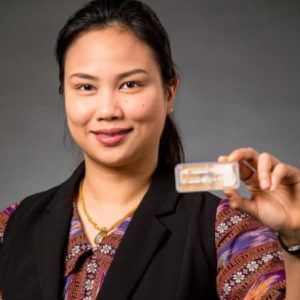
Nuttada Panpradist, a fifth year Ph.D. student in Associate Professor Barry Lutz’s lab, focuses on developing affordable technologies that reduce disparities in health care. Her work bridges engineering, molecular biology, chemistry, physics and global health to enable diagnostic and drug resistance screening for infectious diseases, including tuberculosis and HIV, in low-resource clinical settings.
Nuttada is collaborating with researchers from UW and Seattle Children’s Research Institute to develop OLA Simple, an instrument-free, point-of-care device that can diagnose HIV, and detect drug resistance and viral load. In 2016, Nuttada received the $50,000 Third Place APF Student Technology Prize for Primary Healthcare for her work on OLA Simple.
With OLA Simple, Nuttada seeks to confront the increasing burden of HIV drug resistance in the developing world, where lab-based testing is often out of reach. The device is designed to be easy to use, fast and affordable – less than $10 per test, she hopes. The versatile technology could be adapted for a range of conditions, including other infectious diseases, Alzheimer’s and genetic disorders.
A native of Thailand, Nuttada arrived in Seattle set on pursuing bioengineering. In Thailand, she earned a bachelor’s of engineering in petrochemical and polymeric materials. After graduating, she found her job prospects in Thailand to be slim – requirements for positions in her field explicitly excluded women. Empowered with a desire to advocate for equal access to health care and to serve as a role model for women, she decided to move to the U.S. to advance her studies.
Beyond her work in the lab, Nuttada has teamed up with fellow BioE Ph.D. student Qin Wang, Pharmacy Economics Ph.D. student Blythe Anderson, Pharmacy student Richard Lee, BioE Ph.D. alumnus Joshua Buser and Electrical Engineering alumnus Rahil Jain to pitch OLA Simple at this year’s UW entrepreneurship competitions. The team received the 2nd place prize at this winter’s Holloman Health Innovation Challenge, and will compete in the Sweet Sixteen round – and for the chance to advance to the finals – of the May 24’s UW Business Plan Competition.
After completing her Ph.D., Nuttada plans to pursue a career in academia, where she hopes to lead an independent research program, teach the next generation of bioengineers and focus on real-world implementation of her work.
Ty Youngblood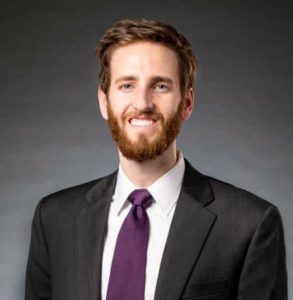
Ty is a fourth year Ph.D. student in Professor Joan Sanders’ lab, where he integrates bioinstrumentation and biomechanics approaches into efforts to develop next-generation prosthetic devices for lower limb loss. His goal is to improve prosthetic device users’ quality of life with devices that offer greater comfort, function and mobility.
Current prosthetic devices do not adequately address the biological challenges posed by residual limbs, such as limb volume loss. As a result, they can become uncomfortable and inhibit wearers’ activities. Ty focuses on studying the complex interface between a residual limb and prosthetic device, and how to integrate physiological and mechanical sensors into new devices that adapt to meet user needs.
As he works towards creating better prosthetic devices, Ty not only collaborates with fellow researchers but also people living with limb loss. These volunteers participate in studies that collect physiological and behavioral data, and inform prosthetic device function and design.
Outside of research, Ty is dedicated to serving leadership roles in the BioE student community and educational outreach. He became involved with Bioengineers without Borders (BwB), and is currently the organization’s vice president of operations. He applied his research expertise and global health knowledge gained from his role with BwB to develop a learning module on prosthetics in low-resource settings, which he taught at BioE’s summer camp for high school students and other K12 outreach events. From 2015 to 2017, he served as a graduate student lead in BioEngage, BioE’s industry engagement program, and helped connect students with career options and opportunities in industry.
Each summer, Ty returns to his home state of South Carolina to volunteer at YMCA Camp Cherokee, where participating as a camper, counselor or administrator is a long-standing tradition of his family. He also volunteers at Camp LUCK (Lucky Unlimited Cardiac Kids), a medically supervised residential camp for kids with heart disease and their siblings. At Camp LUCK, he aims to help participants discover the life-changing joy and adventure of summer camp.
After completing his Ph.D. studies, Ty plans to pursue a career in research and development in the medical device industry. He is excited by the possibilities of bringing medical devices from concept to consumer.



